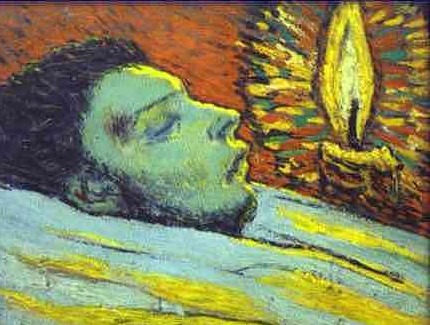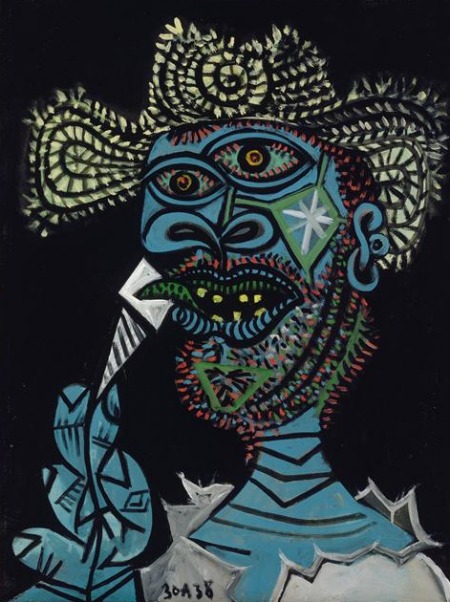Collectors who hire experts to solve problems that don’t exist till help arrives are responsible for the equivalent of bad face lifts on old masters. What the artists intended too frequently recedes under an abrasive cleaning or a deadening
layer of varnish.
Current practices discourage irreversible
interventions. That means John Currin’s work is a little safer than
artists who preceded him, such as Picasso, although having the money to
buy good advice doesn’t guarantee it will be heeded. I know
a collector who washed a DeKooning sculpture with
detergent, rubbing till the surface became mottled.
The best thing about the Picasso exhibit at the Seattle Art Museum stems from its history. More than 90 percent of the 100-plus paintings. sculptures and drawings was not sold but saved by the artist and transferred after his death to the Musée Picasso in Paris, now closed for renovation. Because this material never entered the market and its care was excellent, the surfaces remain fresh. John Russell once described a painting as a “vegetable construct that changes in time.” But time has barely touched what’s on view till January 17 in Seattle: the evidence of the man’s hand, a fusion of formal innovation and shaggy heat, his love of the body and faith in its ability to endure the tragic without losing its nerve.
Anne Baldassari, director of the Musée Picasso, selected 150 paintings, sculptures, drawings and photographs currently at the Seattle Art Museum. They illustrate the myriad-minded course of the artist’s career. The result is a private tour of a public figure, Picasso as he saw himself. Credit goes to SAM for a clean installation, free of excessive wall text.
Picasso the innovator knew that art comes from art, and that painting is a visual kind of call and response. To mark the suicide of his friend, a young Picasso turned to Van Gogh. Those are Van Gogh’s paint pulses radiating around the candle in Death of Casagemas from 1901, Van Gogh’s color sense turned to brutally realistic purpose.
 Picasso could draw with a delicacy to rival Ingres and paint to match the austere harmonies of a late Cezanne. Most of the time, the Spanish-born artist chose not to. Instead, he celebrated himself as the voracious center of a carnal universe, draping the world of the mind in the shaggy relish of physical desire.
Picasso could draw with a delicacy to rival Ingres and paint to match the austere harmonies of a late Cezanne. Most of the time, the Spanish-born artist chose not to. Instead, he celebrated himself as the voracious center of a carnal universe, draping the world of the mind in the shaggy relish of physical desire.
Always there was a dialogue with other artists: Most obviously in this show, Van Gogh, Degas, Cezanne, Renoir and from closer to his own generation, Matisse.
Van Gogh, again: In late summer, 1938, Picasso read that the Nazis had burned two Van Gogh paintings to demonstrate their scorn. To demonstrate his, he responded with L’Homme au chapeau de paille (Man with a Straw Hat and Ice Cream Cone), himself as Van Gogh. Wearing the Dutch artist’s straw hat, he affirmed a beauty outside the realm of convention, with a lurid tongue licking the cone.
 Possibly because he could afford to keep fewer paintings in his youth, the exhibit that charts his long career slights his early years in favor of his post-Cubist, robust middle and late years.
Possibly because he could afford to keep fewer paintings in his youth, the exhibit that charts his long career slights his early years in favor of his post-Cubist, robust middle and late years.
For Picasso, the world was a puzzle no one can solve. Instead of searching for the final click when all the pieces fuse into place, he celebrated the off-balance, the animate, the unstable heart of motion.
As Philip Larkin so aptly observed, Being brave lets no one off the grave. Picasso explored the active life in art, the realm in which he had few peers. His work asserts that old goats can continue to cavort, and yet occasionally, limits are acknowledged. In The Kiss from 1969, an old man in the middle of seducing a young woman pauses to look past her. Instead of the familiar theme of sexual fusion, he painted the moment of drifting off, when the hero no longer remembers the lines of his play.
In his lifetime, plenty of critics found his late work dismaying. I doubt art history will agree with them. He saw himself as supreme in the most important work there is. At the end of the exhibit, SAM hung a quote from the artist, and it’s a good one.
God is really only another artist. He invented the giraffes, the leopard and the cat. He has no real style. He just goes on trying other things.
Through Jan. 17.



Dear me. Why is this post dated Dec. 14? U haven’t posted since the 10th–I was worried u were sick again.
Dear Miss Marple: The system notes when a post is started, not when it appears. The responsibility to update is mine, which thanks to you I now have done. P.S. Not sick. Regina
Dear Regina,Thanks for the information about Picasso.It always enlightening to know about a great artist details.I am an admirer of his life and work.the same way I admire the Renaissance
great painters.
carlo
Regina,
Really enjoyed this post. Thanks for acknowledging that “old goats can continue to cavort.” I’ll take that as a “word to the wise.” Agree that Picasso’s work will outlive his critics.
Happy New Year, Jack
Great article, thanks
Do you need chicken soup.Your silence worries me.
Thanks for this post. I’ve always had a distant love for Picasso’s work because of all the hidden meanings and images in his paintings. This article provided me with so much information on more unknown facts about Picasso’s work and collaborations.
You may have inspired my own blog post about artist collaborations, thank you!